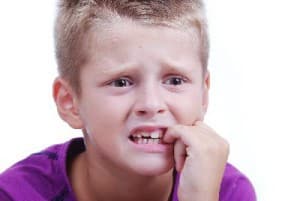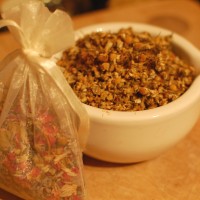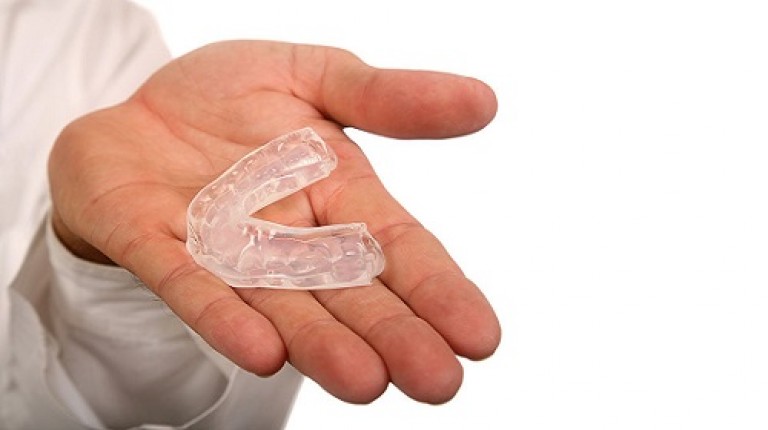Loving parents carefully protect the sleep and health of their child. The grinding of teeth, which sometimes comes from the silence of the children's bedroom, makes them perplexed. Why is the baby doing this? Are there reasons for concern? How to overcome this phenomenon? The solution to the problem must be sought in the daily routine and well-being of the crumbs.
Bruxism (from the Greek for “creaking”) is the intense grinding of teeth during sleep. According to the World Health Organization, it occurs in 3% of adults and 50% of children from 6 to 8 years old. However, there is no such disease in the international classifier of diseases ICD-10, compiled by WHO. Until now, doctors cannot say exactly why children grind their teeth in their sleep. An attack can last from 10 seconds to several minutes. In this case, the sound is similar to a clicking sound.
With age, this phenomenon in children disappears. However, parents should pay close attention to it. Bruxism can be the result of diseases or disorders of the nervous system.

Causes of the squeak
An attack can occur in children, both during the day and at night. There are many hypotheses about the reasons for its occurrence.

Psychological
- Sleep disturbance . If a child grinds his teeth at night, doctors tend to equate this with somnambulism and sleep talking. The attack may be the result of a violation of the regulation of the depth of sleep. It is accompanied by nightmares, frequent awakenings, screaming and difficult falling asleep.
- Stress, deep feelings. Overexcitation, rich daytime experiences, excessive mobility, stress can also explain why children grind their teeth. For kids, any event in life seems significant. They react to changes, loud or offensive words are much sharper. moving, changing kindergarten or school, the birth of another child in the family can affect psychological state baby. Sometimes bruxism can be a signal that the baby feels neglected and unwanted.
- Sucking reflex. Occurs in children who are early weaned. It can also be due to the refusal of a bottle or pacifier. With the help of the movement of the teeth, the baby physically imitates the process of sucking and calms down.
- Violations of the daily routine. Excessive workload of the child with school or visiting circles, increased excitability, chronic fatigue can provoke teeth grinding at night. It is still difficult for a child to consciously control his emotions. Anger, delight, general weakness at the end of the day can give rise to aggression. Also, don't overfeed your baby before bed. All processes in the body slow down at this time, and the stomach cannot cope with the load. This leads to restless and unhealthy sleep.
- mental illness. Deep mental disorders can give rise to bouts of bruxism. At the first suspicion of a baby’s disease, you need to show a neurologist and undergo a full examination.
- Taking or withdrawing medication. Some medicines may have side effects in the form of a temporary imbalance of the psyche or sleep disturbance.
- Common bad habit. Some kids just enjoy grinding their teeth. They do it completely consciously.
Grinding of teeth during the daytime can be due to the same reasons as a nocturnal attack. However, during the day, parents can ask the baby what is bothering him. Ask the child to close his teeth only during meals, so that the jaw muscles rest. Follow the rule: "Lips together, teeth apart." Stop any attempts to grind your teeth.
Possible consequences
If your child grinds their teeth day or night, don't panic. In most cases, the habit goes away on its own after a while. However, it is worth paying attention to the consequences of frequent attacks:
- damage to tooth enamel;
- caries;
- inflammation in the oral cavity;
- improper placement of teeth;
- tension in the neck and headaches;
- inflammation of the temporomandibular joint and the development of pathology.

What to do when a child grinds his teeth in a dream is the first question that parents face. Our advice will help you find a way out.
- Visit the dentist. The modern level of development of dentistry makes it possible to identify and eliminate almost any defect of the jaw and correct the bite. If you have a filling, ask your doctor to check how well it is installed. If the baby is teething, teethers and special gels will help to relieve inflammation of the gums.
- Give your jaws a load. Give your child more fresh vegetables and fruits, offer to gnaw crackers. This increases the load on the jaw muscles. Remove from the diet foods with dyes, animal fats and sugar.
- Put on caps. These are special attachments for teeth. They will prevent the enamel from being erased and will impede the movement of the jaws.
- Drink vitamins. Reception will help prevent beriberi vitamin complexes. To prevent the development of caries, teeth can be mineralized in dentistry. Include foods rich in calcium, phosphorus, potassium in your diet: cheese, liver,.
- Comfort your baby 2-3 hours before sleep. It is not necessary to conduct emotional or outdoor games with the child immediately before bedtime. Turn off the TV and bright lights. Soothe the baby, gently talk to him, read a book, sing a lullaby. Peace of mind and maternal warmth are your faithful assistants in the fight against bruxism.
- Follow the daily routine. Do not allow sudden changes in the regimen of the child and excessive overwork. Children are very conservative in perception environment. They perceive any significant changes as a stressful situation.
- Get a cheek massage. To stop the attack, make crumb masses of the cheeks in a circular motion with your fingers. This will help relax the chewing muscles.
- Don't feed at night. A plentiful heavy dinner is a guarantee of restless sleep. Offer your child a glass or milk. This will be enough to muffle the feeling of hunger and not overload the stomach.
- Consult a pediatrician. If the child experiences headaches, the general condition worsens against the background of the manifestation of bruxism, consult a doctor. The pediatrician will prescribe blood and feces tests for the presence of helminths. With inflamed adenoids, the baby will be sent for examination and treatment by an otolaryngologist. A neuropathologist will help to avoid serious disturbances in the functioning of the nervous system.
- More , ventilate the room before going to bed. Lack of oxygen can lead to excitation of the body. Fresh air and easy walks have a beneficial effect on nervous system.



Eliminate discomfort
After an attack, babies sometimes experience discomfort in the jaws. Adults can help remove them in simple ways.
- Warm compresses. Eliminate toothache and ease tension. Wet a washcloth or towel with warm water and apply to your cheek. Compresses should be changed as they cool.
- . Chamomile flowers have disinfectant and anti-inflammatory properties. To prepare, pour 2 tablespoons of inflorescences with boiling water and cook for 10 minutes. Strain the infused broth and cool. Let the child rinse their teeth. Soon pain will pass.
bruxism is not just bad habit or an indication of illness. If parents do not know why the child grinds his teeth at night, this is an occasion to reconsider the process of caring for the baby and his daily routine. The "root" of many illnesses and peculiarities in the child's behavior lies in a tense psychological atmosphere.
Bruxism, or grinding of teeth, is most often seen in children during a night's sleep. The causes of bruxism lie in neuropsychiatric disorders and internal diseases. Let's try to figure out why the child grinds his teeth, and what to do if there is a night grinding.
There are several factors that, in combination or individually, affect the baby's body and cause rattles in sleep. All the existing causes of nocturnal bruxism can be combined with one common symptom: something is bothering. The task of the parent is to deal with the cause of anxiety and eliminate its impact. What might be bothering your child?
Nervous experiences, stress, overexertion during the day are expressed in uncontrollable grinding at night.

In the list of factors that cause bruxism in children during sleep, neuropsychic experiences rank #1.
It is possible to diagnose a violation of the mental balance of a child by other signs that often accompany manifestations of bruxism.
- intimidated look, uncertain gait, stooped posture;
- the child bites his nails;
- unexpectedly strong negative reaction of crying to small irritations;
- often clenched fists;
- a child hides in a dream thumb inside the cam;
- obsessive repetitive movements: uncontrollable swinging of the legs (sitting on a chair), twitching of the eyebrows, eyelids, sniffing the nose without signs of a runny nose, coughing without the presence of illness;
- low perseverance, inability to concentrate;
- restless sleep, twitching of limbs in sleep, frequent awakening from nightmares, night terrors.
The listed signs of childhood neurosis require careful attention from parents and, possibly, treatment. If a cut in a dream is accompanied by the above symptoms during the day, then the causes of bruxism are in neurosis, stress, hidden or explicit mental experiences. What to do?

The most important medicine is to surround the child with love and care. Accept and love him unconditionally, do not evaluate negatively his personality (you are bad), but give, if necessary, a negative assessment of his actions (your act is bad).
Eliminate screaming in the presence of a child, do not pour out your irritability and anger on him, your failures at work or in your personal life.
Deal with possible stress at school or kindergarten. Talk with a teacher or educator about the situation in the children's team, possible grievances, troubles.
Consult with a psychologist, develop the right tactics of behavior, in every way instill confidence in the child and increase his self-esteem.
Teeth grinding at night and internal diseases
If a child grinds his teeth at night in the absence of the above signs of neurosis, then the reason is in internal diseases. Such a grinding, caused by internal pain sensations, is possible not only at night in a dream, but also during the day. Teeth grinding at night appears more often than during the day due to upbringing and the presence of self-control, generally accepted norms of behavior.
 What your baby or an adult child, a teenager can be ill with - a medical examination will definitely find out. A number of methods of alternative medicine (iridodiagnostics on the iris, computer diagnostics) allow you to determine the presence of disorders in various organs and systems without lengthy visits to different doctors and without passing a large number of tests. If you wish, you can confirm the diagnoses with a general practitioner or a narrow specialist (gastroenterologist, nephrologist, neuropathologist, otolaryngologist), during a medical examination (urine, blood and feces tests, ultrasound examinations).
What your baby or an adult child, a teenager can be ill with - a medical examination will definitely find out. A number of methods of alternative medicine (iridodiagnostics on the iris, computer diagnostics) allow you to determine the presence of disorders in various organs and systems without lengthy visits to different doctors and without passing a large number of tests. If you wish, you can confirm the diagnoses with a general practitioner or a narrow specialist (gastroenterologist, nephrologist, neuropathologist, otolaryngologist), during a medical examination (urine, blood and feces tests, ultrasound examinations).
Diseases of the ENT organs (adenoids, sinusitis) lead to drying out of the nasopharynx. Therefore, in a dream, the child begins to instinctively move his jaws, causing an unpleasant rattle.
Often, bruxism in children appears in a dream with diseases of the gastrointestinal tract (GIT).
Night rattle and worms
It is important to know that most of the pediatric gastrointestinal diagnoses are associated with the presence of helminths. What to do in this case?
The fact that a child grinds his teeth at night or during the day due to the presence of worms is not confirmed by official medicine. However, in most cases, gnashing in a dream disappears after antihelminthic therapy. At the same time, the general condition, immunity improves, and the allergic reaction decreases. What else confirms the presence of helminths in the body?
The activity of worms disrupts the microflora of the organ in which they settled (intestines, liver, lung cavity), causing causeless nausea, pallor, lack of appetite, causeless dry cough. In the process of life, helminths release toxic substances, as a result of which the child has signs of allergies. Immunity is noticeably reduced, frequent colds and viral infections appear. How to treat a child?
Chemical preparations against helminthic invasions are toxic. If you use pharmacy products, you need to take pyrantel or another antihelminthic drug three times with a break of 10-11 days. The toxic agent acts only on adult worms, without affecting the capsules with the larvae. Therefore, repeated administration of the drug is necessary in order to neutralize the hatched helminths.
 Of the natural remedies, pumpkin seed and wormwood are the most effective. Pumpkin seeds are ground into powder and given to children twice a day. Reception of pumpkin powder begins with small doses (on the tip of a spoon), increasing it to a third of a teaspoon. If wormwood is used, then it is consumed along with a small amount of honey to hide the strong bitterness. The course of treatment is a month. It is recommended to repeat antihelminthic therapy after 4-5 months again.
Of the natural remedies, pumpkin seed and wormwood are the most effective. Pumpkin seeds are ground into powder and given to children twice a day. Reception of pumpkin powder begins with small doses (on the tip of a spoon), increasing it to a third of a teaspoon. If wormwood is used, then it is consumed along with a small amount of honey to hide the strong bitterness. The course of treatment is a month. It is recommended to repeat antihelminthic therapy after 4-5 months again.
The reasons for the appearance of bruxism in a dream are different. It is possible and necessary to identify and eliminate the factors that cause grinding of teeth. This will ensure not only the preservation of tooth enamel, but also the further normal growth and development of the child.
Approximately one in three or five children grind their teeth when they sleep. These are medical statistics, but many experts believe that this happens occasionally in almost every child. Doctors call this phenomenon bruxism, which in translation from Greek sounds exactly like “gnashing of teeth”. Bruxism is not singled out as a separate disease, is not a pathology, but characterizes a condition that is “normally” not characteristic of a person. They say about bruxism if an involuntary contraction of the masticatory muscle occurs, as a result of which a person, regardless of his own will, uncontrollably clenching his jaw, making a grinding sound with his teeth.
Bruxism also occurs among the adult population, but children, especially boys, are much more likely to suffer from it. Moreover, mainly the child grinds his teeth during sleep.
Why does a child grind his teeth in a dream at night: reasons
The mechanism of bruxism is well known to medicine, but the causes of its manifestation remain a mystery to scientists. There is a strong belief among the people that this is guaranteed to indicate worms if a child grinds his teeth at night. But doctors categorically refute this misconception: if the baby has helminths, then gnashing of teeth has nothing to do with it.
Bruxism indicates that the masticatory muscle is in increased tone, and most likely this is due to the nervous and emotional stress that children experience, because their nervous system is very unstable, easily vulnerable, and very often the child is impressed by things and events that We adults don't care.
Over many years of studying bruxism, scientists have come to the conclusion that the nature of its origin in different children may differ. They identified several likely reasons why a child grinds his teeth:
- state of stress. Emotional outbursts, great mental stress, excessive fatigue ... All these factors can bring the nervous system out of balance, which can result in a huge variety of different manifestations. One of these is very likely to be nocturnal bruxism.
- Eruption and replacement of milk teeth. All parents know that the process of teething in children is accompanied by multiple uncomfortable manifestations, including pain and itching in the gums. Trying to "scratch" them, children can grind their teeth, and therefore bruxism is observed even in young children. The second peak of its exacerbation is the period of change of milk teeth by molars, and it is the children of preschool and younger school age Most often they grind their teeth.
- Heredity. It has been observed that the offspring of parents who also grind their teeth or did so in childhood very often inherit this “bad habit” from moms and dads.
- Nutrient deficiency in the body. Some scientists believe that teeth grinding is one of the incarnations of a convulsive syndrome that develops due to a lack of calcium and some other substances (B vitamins, amino acids, magnesium) in the child's body.
- Manifestations of sleep disturbance. Others believe that bruxism is similar in nature to snoring, sleepwalking, sleepwalking, enuresis, nightmares, that is, it is one of the types of sleep disorders.
- Inflammation of the jaw joint. This reason is not common, but if the child, nevertheless, has an inflamed jaw joint (which, by the way, parents may not even suspect), then he will most likely grind his teeth.
In addition, many pediatricians state the fact thatadenoiditisand bruxism are very often combined with each other, which suggests a close relationship between these conditions. Sometimes babies will grit their teeth in response to sensations that are incomprehensible to them, when it hurts or stuffs their ear, when it is hard to breathe with nasal congestion. There is also an opinion that the child will fasten his first teeth out of habit: thus, studying changes in his mouth.
Why does a child grind his teeth during the day, not in a dream
The tension of the jaw muscles during bruxism occurs involuntarily, that is, a person does this not on purpose and uncontrollably. And most often, parents hear the rattle at night, when the baby is sleeping. However, some notice that the child grinds his teeth during the day. It is possible that he is simply fooling around, exploring the possibilities of his teeth and jaws - in this case, it is recommended to quietly transfer his attention to something else (playing with imitating animal sounds helps a lot). But more often, nevertheless, the grinding of teeth during the day is caused by other factors.
Experts believe that daytime manifestations of bruxism are more indicative of its cause, which lies in teething and related unpleasant sensations. In view of this, some consider the habit of babies to involuntarily pull everything into their mouths and gnaw as one of the manifestations of bruxism.
But even on a nervous basis, a child can inadvertently clench his jaw. By the way, there is an opinion that such a phenomenon indicates an insufficient load on the jaw apparatus: in this case, it is recommended to “load” the child’s jaws during the daytime - for example, give him to gnaw hard raw vegetables and fruits, chew nuts.
In the vast majority of cases, bruxism resolves on its own, and only about 4% of children take this habit with them. adulthood. As a rule, it does not harm the child and does not threaten, but sometimes it becomes really harmful and requires some kind of “treatment”.
What to do if a child grinds his teeth: treatment
Since bruxism is not a disease as such, there is no need to talk about treatment in the classical sense. However, different doctors give a variety of recommendations on what to do if the child grinds his teeth.
First of all, you should know that pronounced bruxism can distort the physiological bite of the child, lead to enamel abrasion and cause other orthodontic problems, as well as interfere with a good night's rest and recovery. A specialist can identify a violation or inflammation in the jaw apparatus. If there are no deviations in this, then all your attention should be directed mainly to the psycho-emotional state of the child. It is extremely important that nothing worries him: any unresolved situations, conflicts, fears, anxieties, problems must be resolved. If you are absolutely sure that the baby is not disturbed by anything, follow how he spends the evening. Avoid a few hours before bed, computer and telephone games, any stress, physical and emotional activity (even positive emotions experienced the day before can excite a child at night). It is important that the baby goes to bed in a good mood. To make children's sleep as healthy and useful as possible, ventilate the room well and, if possible, do a wet cleaning.
A child who regularly grinds his teeth in his sleep feels tired and overwhelmed in the morning, he has a headache, buzzing in his ears, and a bad mood. Showing increased nervous excitability during the day, he again "tenses up" during a night's sleep and again grinds his teeth. Only parents can break this vicious circle.
However, if you notice that the child grinds teeth violently every night for a long period of time, or that such episodes last more than 10 seconds and repeat several times a night, then you will most likely need to seek help from specialists. It is also impossible to ignore the situation when a child suffering from bruxism regularly wakes up with bad mood and well-being.
Why does a child grind his teeth
In general, the now popular pediatrician Yevgeny Komarovsky urges parents not to get involved in the treatment of bruxism: often this phenomenon is not dangerous and is temporary. With a pronounced course, the pediatrician may advise the child to take additional calcium preparations, and the orthodontist - wearing a special cap, which is worn at night and prevents the teeth from erasing the enamel as a result of strong friction against each other.
Otherwise, Komarovsky is in solidarity with modern pediatricians and therapists: today it is often impossible to answer exactly why a child grinds his teeth, but definitely not because of worms!
Specially for -Larisa Nezabudkina
Many fathers and mothers face such a problem in their children as teeth grinding at night. Why does a child grind his teeth in a dream, what does it mean? The medical name for this pathology is bruxism. This phenomenon scares parents and makes them panic. The rattle is single, it will last several minutes. During the day, the rattle can also be repeated. Let's try to find out the main causes and essence of the problem.
Related articles:
It is not always worth panicking and running to the doctor, 90% of children grind their teeth at least once in their lives. It can be observed at night, sometimes in the daytime. If the squeaks are single in nature and are repeated extremely rarely, you don’t have to worry.
Main reasons
In cases of regular repetition, it is better to find out the cause and visit a qualified doctor.
- malocclusion;
- transferred stress;
- pathology of the teeth and jaw;
- teething.

Bite
Malocclusion can be congenital or acquired. Due to the incorrect formation of the jaw, the child may make uncharacteristic sounds in a dream. In this case, you need to contact a pediatric orthodontist. Violation of the bite often leads to such negative consequences as crooked teeth, dentin - aging of tooth enamel, inflammation of periodontal tissues. The doctor will prescribe measures to eliminate the problem.
Stress
The child's psyche is not stable and any trifle can turn out to be a shock, not to mention real nervous injuries. The first days in kindergarten, new acquaintances, conflicts with peers - this can cause stress in a child. As a result of mental disorders, bruxism develops.
Adenoids
The growth of adenoid tissue leads to deformation of the jaw apparatus. The increase in lymph exerts internal pressure. Hence the formation of an irregular structure of the jaw. will help to avoid the development of grinding. In 80% of cases, it is the presence of adenoids that explains the appearance of night grinding.

- Pathologies of the dental apparatus can cause unpleasant grinding. Timely contact with a specialist will help to solve the problem and avoid complications.
- Cutting teeth can also generate grinding teeth.
Important! Do not attempt to diagnose yourself. Do not self-medicate, consultation with a specialist is necessary.
bruxism symptoms
This disease has its own symptoms:
- drowsiness. The child is lethargic, inactive, constantly wants to sleep;
- headache. It can be weaker, stronger, at night or during the daytime, this reduces the quality of life and interferes with development;
- irritability. Due to poor-quality sleep, the child is nervous over trifles, becomes capricious, loses interest in everything;
- loosening and abrasion of teeth. Teeth are subjected to constant stress, stagger and fall out;
- Ear ache. It can be sharp, stabbing, aching;
- poor appetite. The child refuses to eat, which leads to a general deterioration in health;
- spasm of the facial muscles. Uncharacteristic convulsions of the facial apparatus, they occur involuntarily, cause a lot of discomfort;
- malocclusion. It can be determined with the naked eye.
- poor academic performance. Grades drop, the child's mood worsens.

You can determine the disease with the help of special equipment. polysomyographic examination. This procedure will not cause your child much discomfort. During sleep, special sensors are connected to the body that record brain impulses, muscle activity, eye movement, breathing, and heartbeat. Such studies help to paint a clearer picture of deviations and prescribe adequate treatment.
Treatment and prevention
Treatment of night grinding in children is aimed at maximizing the relaxation of the masticatory muscles. The main thing is to identify the cause and take the necessary measures. The earlier a problem is diagnosed, the less effort will be needed to cure it. There are cases when bruxism of early age independently passed in some children.
It is important to know! This is not a reason to let the disease take its course. Consultation with a doctor will not hurt, the earlier a pathology is detected, the easier it is to cure it.
Attention to bite. When closed, the upper and lower teeth should not touch, the upper jaw should come forward. If the child feels muscle tension, you should try to relax them.
Minimize stressful situations. You can relax the nervous system with the help of massage, yoga, simple physical exercises. Great holiday for the nervous system there will be walking with a child, communication with pets.
Jaw loading during the day will reduce nighttime grinding. Can be chewed chewing gum, gnaw seeds, nuts.
Tires
Protection of teeth during the daytime consists in wearing special splints, they are invisible when put on. The dentist selects tires, taking into account the individual characteristics of the patient's jaw. This method prevents clenching of the teeth. As a result, the enamel is more protected. Teeth are less subject to friction.
Caps
At night, you need to use special mouthguards. They are made from thermoplastic. Tight fit to the front teeth, providing maximum protection against abrasion. It is better to purchase the device as prescribed by the dentist in pharmacies and specialized stores. The doctor will select the most suitable option.

- Before going to bed, if there is a feeling of tension in the jaw area, apply a warm heating pad or compress. This will soothe and relax the muscles.
- With bruxism due to nervous disorders, you can give the child a bath with soothing herbs, give mint tea.
- In severe cases, the doctor prescribes drugs that reduce nervous tension.
- Facial massage helps a lot. It can be done by parents. Older children are able to independently carry out the procedure.
- You can not play active games before going to bed. Watch films that excite the psyche.
Dinner should be light. No fatty, carbohydrate-rich foods. It must be porridge vegetable puree, fruit.

Be sure to talk to your child. Perhaps, in the course of a frank conversation, it will be possible to find out the reason that led to a nervous breakdown.
Remember! You can not think that this disease is not serious. The consequences of neglected bruxism can be very dangerous, up to serious disorders of the nervous system.
vitamins
Certain vitamins may be prescribed by a doctor. Your task is to organize for your child proper nutrition. As already mentioned, it is worth avoiding foods rich in caffeine, do not pass before bedtime. Eat as many vegetables and fruits as possible, rich in healthy vitamins and minerals. Include sedatives in your diet herbal teas, infusions. A complete cure is possible thanks to an integrated approach. Appointments of specialists and independent efforts will help to overcome the disease. Be attentive to your health, do not get sick.
The child grinds his teeth: why, what to do
It often happens, at night, less often during the day, you hear how your child, instead of snoring peacefully, grinds his teeth. Panic? What to do? Where to run? Let's figure it out.
If the attacks are very rare and last no more than 1-2 minutes - this is not a reason for excitement. Real bruxism can be diagnosed when the creaking lasts from 3 minutes. up to half an hour, and more than once. Let's try to understand what are the causes of children's bruxism.
Why does the baby grind his teeth so loudly and for a long time?
The disease usually occurs in children ages 2-3 years. It often happens that by the age of 6-7 it passes, as suddenly as it appears. What are the causes of bruxism? So far, there is no clear answer. And drugs that relieve the problem reliably and for a long time are also not produced. You should not despair. Experts were able to identify several causes that doctors believe can cause bouts of bruxism.
So this is:
Occurs when teeth erupt. Everything is simple. The baby's milk teeth are cut, and he experiences from this unpleasant pain and a state of discomfort in the gum area. In order to reduce pain and relieve itching, he tries, as it were, to scratch the growing teeth among themselves. This results in a creak. Such bruxism does not require special intervention. Teeth will grow and it will pass;
caused by malocclusion. The bite, almost always, is already formed by the age of 3. With factors such as thumb sucking, jaw disorders, acute colds, heredity, bite may develop incorrectly. The child is unaware of this and, intuitively, tries to keep the jaw straight as necessary. As a result, bruxism begins. It is necessary to immediately visit the dentist in order to correct this pathology;
a direct consequence of a lack of calcium in the child's body. Specialists very often record signs of bruxism in cases where the baby's diet does not contain enough calcium;
the impact of frequent breakdowns on nervous grounds and stress. This reason should be recognized as the most common. Can you tell me where stress comes from at this age? Everything is simple. Weaned - stress. Mom is absent for a long time - stress. Loud, unpleasant sounds from the street - stress. Continue? Then the first visit to kindergarten. Evening scandal of parents. Divorce. The mind of a child is a very delicate matter. Even in sleep, the child cannot calm down. So he grinds his teeth as soon as he falls asleep;
hereditary phenomenon. Find out from your parents, no one has suffered from bruxism in the same early age. The likelihood that a baby will inherit bruxism from their parents is quite high;
the reaction of the child's body to various diseases. Here the worms do not interfere with checking. And children especially suffer when they have sinusitis, adenoids, polyps. They are accompanied by such unpleasant phenomena as respiratory failure or dry mouth. The child begins to grind his teeth, so he increases the secretion of saliva and it becomes easier for him to breathe.
How to help a baby if he constantly grinds his teeth in a dream?
First, make an observation: how often attacks appear, how long they last, how often they resume. Now let's get started:
The creaking that appears during the eruption of milk teeth can be treated with the help of special gels. They make the child feel better. When it turns out that the baby grinds his teeth during the day, then buy him environmentally friendly toys so that he gnaws them and scratches his gums like that;
malocclusion, as we have said, requires the intervention of a dentist. He will establish the cause and help deal with the consequences;
It will be useful, when the first signs of bruxism appear, to comprehensively check the general health of your child's body. Only after that, the specialist will be able to appoint you effective treatment. With the correct diagnosis, it is easier to develop the correct direction of therapy. At the same time, in addition to grinding your teeth, there is an opportunity to cure other diseases;
try, as far as possible, to protect the baby from the appearance of stressful situations. Follow his emotions. Be attentive and patient to the fact that your child is very worried and oppressive. Maybe, in the opinion of an adult, this is a trifle, but in the soul of a child - irresistible stress. Seeing that your baby is overexcited, calm him down, be sure to tell or read a fairy tale at night, pat on the head, kiss him. The task is to relax the children's nervous system and, if possible, calm it down;
often parents are very worried, and the baby likes the sound that he makes with his teeth. In this case, try to explain to the child the consequences of his not at all harmless entertainment. The child will quickly understand and listen to you.
Why the child grinds his teeth, what is the reason for this and what to do about it, we figured it out. So, it is important to remember that almost always children's bruxism goes away. It is only necessary to do everything correctly and actively, and most importantly, promptly help the child to cope with this addiction, otherwise it will go into an advanced stage and destroy his teeth.
